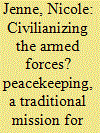| Srl | Item |
| 1 |
ID:
171641


|
|
|
|
|
| Summary/Abstract |
Peacekeeping is widely believed to introduce a civilian element into military culture. However, empirical tests of whether peacekeeping actually yields civilianizing effects on the armed forces are few. Based on the case of Chile, I argue that participation in peacekeeping has failed to lead to fundamental changes in the military’s role perception vis-à-vis civilian actors, despite some practical learning experiences at the individual level. Peacekeeping has been assimilated into the existing warrior model, where civilian actors play only a secondary role.
|
|
|
|
|
|
|
|
|
|
|
|
|
|
|
|
| 2 |
ID:
185252


|
|
|
|
|
| Summary/Abstract |
Samuel Huntington theorized in The Soldier and the State that rather than make the military in the image of society (subjective control), both superior civilian control and military outcomes would result if the military was allowed its own sphere and culture, shaped by military requirements (objective control). Since 1963, the Canadian Armed Forces have argued for objective control, while political leadership and the country have largely paid little attention to military demands for greater social independence. An examination of defense policy, the “civilianization” crisis, the Somalia Inquiry, and diversity legislation and programs demonstrate the triumph of subjective control. This article concludes that subjective control has had costs to civilians in military shirking and to the military in alienation from its parent society. Huntington remains useful, but it is time to consider modern alternatives to understand civil-military relationships.
|
|
|
|
|
|
|
|
|
|
|
|
|
|
|
|
| 3 |
ID:
129493


|
|
|
|
|
| Publication |
2014.
|
| Summary/Abstract |
This paper uses a formal model to analyze the effects of political military competition among states on the size and composition of state. Great economies of scale in warfare, even distribution of military capability among contestants and greater value of contested resources generate higher level of military capacity and growth of government. If there is decreasing return to scale in state revenue generating function and provision of public intermediate inputs, then there will be an increasing size of civilian public sector relative to that of military. The paper finally studies how waves of military revolutions affected international political military competition and the size and composition of government in history.
|
|
|
|
|
|
|
|
|
|
|
|
|
|
|
|